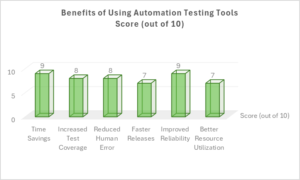Introduction
Automation testing has become an integral part of modern software development, ensuring that applications are tested thoroughly and efficiently. By automating repetitive tasks, these tools save time, reduce human error, and enhance the reliability of software. For professionals looking to enhance their skills in automation testing, enrolling in a Selenium Online Course is a great starting point. Selenium, one of the most popularly used tools in the industry, offers powerful capabilities for automating web applications. This course provides comprehensive training on Selenium WebDriver, TestNG, and other essential frameworks, equipping learners with the knowledge needed to excel in web application testing.
Popular Tools in Automation Testing
1. Selenium
Overview: Selenium supports multiple programming languages, including Java, Python, and C#, and allows testers to automate web applications across different browsers and platforms.
Key Features: Cross-browser compatibility, support for multiple programming languages, integration with CI/CD tools, and a robust user community.
Use Case: Selenium is ideal for functional and regression testing of web applications.
Learning Path: For those interested in mastering Selenium, the Selenium Online Course offers in-depth knowledge of automating web applications, covering Selenium WebDriver, TestNG, and frameworks integration.
2. Jenkins
Overview: Jenkins is widely used in DevOps environments for continuous integration and continuous delivery (CI/CD).
Key Features: Integration with various testing frameworks, extensive plugin ecosystem, and unique pipeline support.
Use Case: Jenkins is best suited for automating the build, test, and deployment process, ensuring rapid feedback during development.
3. TestNG
Overview: TestNG is designed to cover a large range of testing needs, from unit tests to complex integration tests.
Key Features: Annotations for test methods, parallel execution, flexible test configuration, and built-in reporting.
Use Case: TestNG is primarily used for automating unit, functional, and end-to-end testing.
4. JUnit
Overview: JUnit provides an easy way to write and run repeatable tests.
Key Features: Annotations, assertions, test runners, and integration with various IDEs and CI tools.
Use Case: JUnit is used for unit testing Java applications and is often integrated with Selenium for functional testing.
5. Appium
Overview: Appium supports the applications on iOS and Android platforms. i.e, native, hybrid, and mobile web applications.
Key Features: Cross-platform testing, support for multiple languages, and compatibility with Selenium WebDriver.
Use Case: Appium is ideal for testing mobile applications across different platforms and devices.
6. Katalon Studio
Overview: Katalon Studio is an all-in-one automation testing solution that supports web, API, mobile, and desktop applications.
Key Features: Built-in keywords, an intuitive UI, integrations with CI/CD tools, and extensive reporting.
Use Case: Katalon Studio is suitable for teams looking for a comprehensive tool that can handle various types of testing without extensive coding.
Comparison of Automation Testing Tools
| Tool | Supported Platforms | Programming Languages | Key Features | Primary Use Case |
| Selenium | Web | Java, Python, C#, etc. | Cross-browser testing, CI/CD integration | Web application testing |
| Jenkins | CI/CD Pipeline | Java | Automation server, plugin ecosystem | Continuous integration and delivery |
| TestNG | Java | Java | Test configuration, parallel execution, reporting | Unit, functional, and end-to-end testing |
| JUnit | Java | Java | Annotations, assertions, IDE integration | Unit testing for Java applications |
| Appium | Mobile (iOS, Android) | Multiple | Cross-platform testing, Selenium integration | Mobile application testing |
| Katalon Studio | Web, Mobile, API, Desktop | Groovy | All-in-one solution, easy-to-use UI | Comprehensive automation testing |
Is an Automation Software Testing Course Right for You?
If you are passionate about software testing and eager to advance your career in this field, an Automation Software Testing Course is definitely worth considering. Whether you are a beginner looking to break into the industry or an experienced professional seeking to upskill, this course will provide you with the knowledge and tools needed to succeed.

In addition to mastering these tools, professionals interested in pursuing a career in automation testing can benefit from enrolling in an Automation Software Testing Course. This course provides comprehensive training on various automation tools, frameworks, and best practices, equipping testers with the skills needed to excel in their roles.
Conclusion
Automation testing tools are essential in the software development lifecycle, enabling faster releases, improved test coverage, and higher software quality. Tools like Selenium, Jenkins, TestNG, and Appium offer specialized features that cater to different aspects of testing, from web applications to mobile platforms and CI/CD pipelines. By choosing the right tools and integrating them effectively, teams can streamline their testing processes, reduce manual effort, and ensure that their software meets the highest standards of quality.
